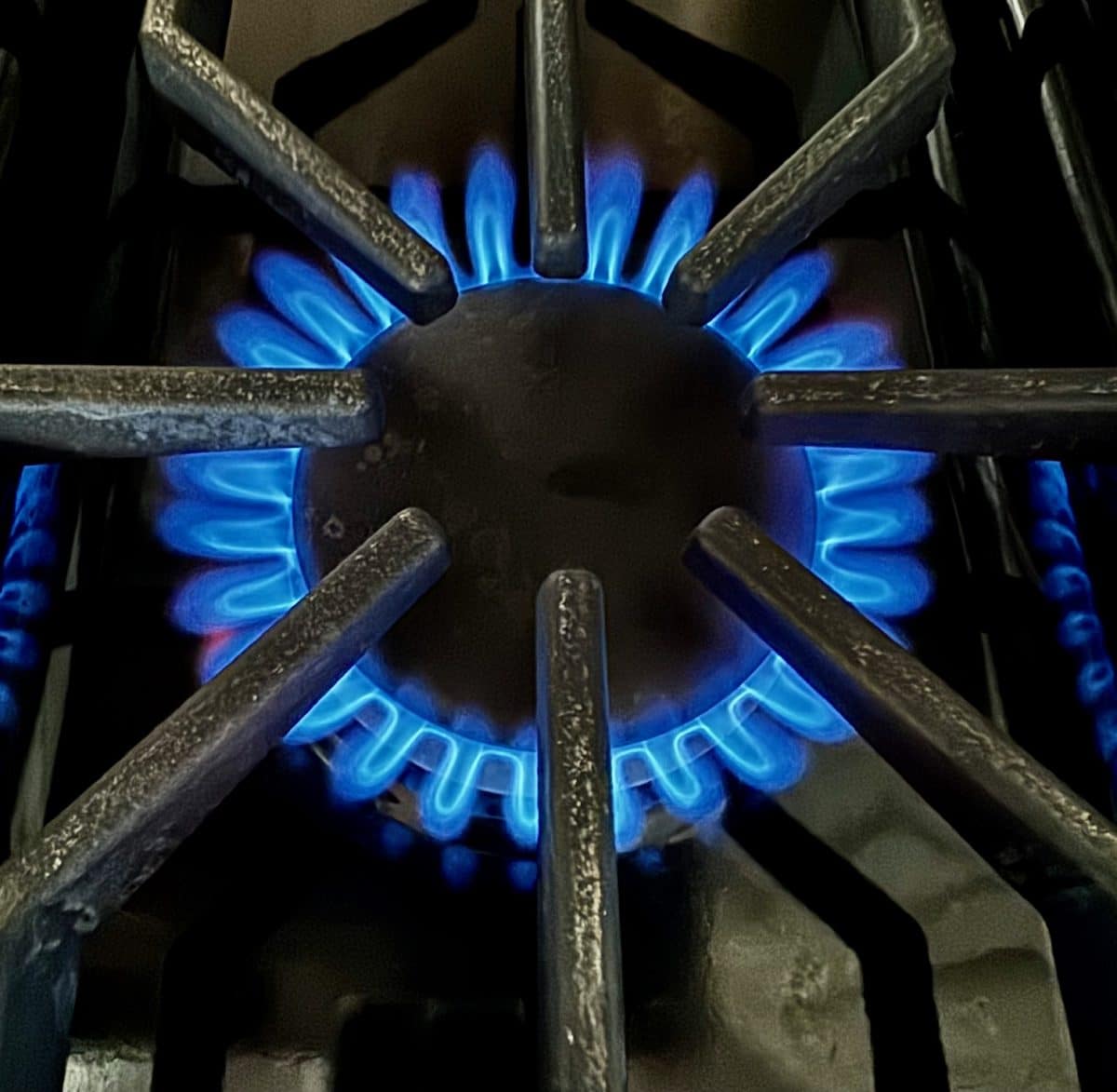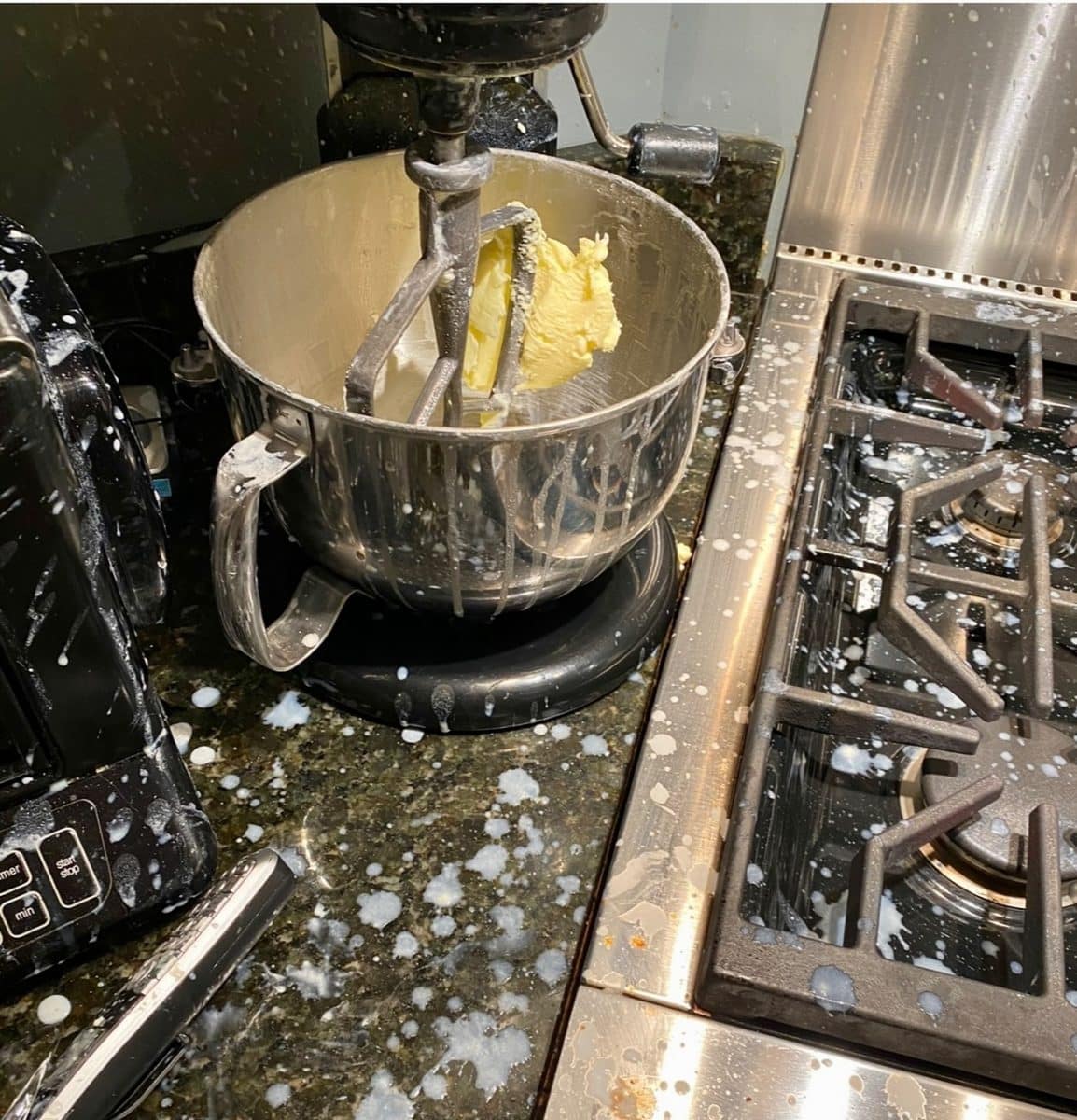Do As I Say, Not As I Did
The sagging plastic touched the spinning beater, wrapping it around the stem, uncovering the bowl, and an explosion of buttermilk covered everything within several feet.
Lessons Learned the Hard Way
Every professional cook can tell of kitchen disasters that will make you cringe. The worst I’ve heard was of the chef who plunged his hand into a sink, not knowing that a new employee had slipped a large razor-sharp knife into the soapy water. Working in any kitchen requires a certain situational awareness of fire and water, tools that are sharp and pans that are heavy or slippery. Things that stick, objects that fall, foods that can spill.
Mistakes don’t always involve cuts and burns. A chef I know described a formal event he was catering with the help of a few of his culinary students. One student was assigned the task of putting roasts in the oven. My friend periodically asked the student how the roasts were and each time the student replied “Fine!” It wasn’t until too late that the chef realized that the roasts were fine in the refrigerator and had not been started. He redesigned the meal on the fly.
I have taught cooking classes to young children, and the first lessons are always about safety. Children tend to be good students in that regard. And if a child is too young to respect a sharp edge or point, they are too young to be handling that equipment.
As adults we can be busy, distracted or careless. Sometimes just ignorant. Mistakes happen. It’s best to learn from others’ mistakes and avoid making our own. Here are a few of mine.
Fire
Many years ago, when I was dating my soon-to-be-husband, I decided to impress him by making tacos. I was heating taco shells in his toaster oven and happily arranging toppings on a platter when I realized that the toaster oven was engulfed in fire. The tacos had been too close to the heating element.
Orange flames and black smoke climbed the front of the freshly-painted white cabinets. There was a fire extinguisher under the sink but in my panic I couldn’t read the tiny print on it or figure out how to work it.

There was no handle like you might expect to see – both sides looked the same. The flames climbed higher but there was not enough smoke to trigger an alarm. I pulled out a bag of flour, tore it open, and smothered the fire with handfuls of flour. The kitchen was strewn with flour, the glossy cabinets were streaked with black, and there were no tacos for lunch.
- Beware of making tacos in a toaster oven; use an oven instead.
- Make sure you have an easy-to-use, easy-to-read fire extinguisher handy in the kitchen.
- Flour is messy but good in a pinch for extinguishing flames.

Splatter
Last year I decided to make honey butter and small loaves of cornbread for all of my friends as holiday gifts. Since I planned to make the butter in quantity and hadn’t made any since my kids were in elementary school, I did a little reading first. There were warnings about the splatter that happens when the milk solids separate from the buttermilk. I decided it would be clever of me to wrap the top of my mixer bowl in plastic, containing any possible mess. I poured cream into the bowl, started the mixer, revved it up to high speed, and it worked beautifully. Until it didn’t. Just as the buttermilk began to splatter against the plastic wrap, the weight of the liquid on the wrap caused it to sag.
The sagging plastic touched the spinning beater, wrapping it around the stem, uncovering the bowl, and an explosion of buttermilk covered everything within several feet.
- A blender is a better choice than a mixer for making butter because it has a closed lid. Just work in batches. Or there’s always an old fashioned butter churn. Or even a Mason jar.
Mandolines
I once posted something on social media about mandolines and someone commented that anyone afraid of a mandoline had no business being in the kitchen. My guess is that the person who wrote it had never actually used a mandoline. I’m a big fan of mandolines in all their variations. Aside from slicers and shredders, a mandoline that makes gaufrettes (those waffle-cut slices that fry up into crisp wafers) will up your culinary game.
But. A cut from a mandoline is an impressive thing that you don’t ever want to experience. Mandolines come with hand guards, but a cut-resistant glove ensures that your fingers and knuckles will remain intact even if you make a slip. I keep several handy and they all work well. My favorite type is made for cleaning fish and has steel threads in it. After you use the glove, don’t forget you’ll need to wash it. I throw mine in the laundry.
- When you use a mandoline, wear a cut-resistant glove. And be careful anyway.
Oil
Long before the days of air-fryers I decided to make French fries. I had never made them before so I found a recipe that called for frying them twice. I sliced the fries, fried them in a pot of oil, then chilled them according to the instructions.
The next day I took them out of the fridge and brought the pot of oil to a boil again. The instructions said to bring the potatoes to room temperature before frying again, but I decided to throw them in cold, thinking that the boiling oil would heat them up quickly and it wouldn’t make a difference.
Big mistake. BIG. HUGE.
According to a 2018 article in Bon Appetit, “As soon as food hits the hot oil, the heat from the oil starts to drive off the moisture from the surface causing all sorts of tiny steam bubbles to escape. If you add too much to the pot at once, the volume of bubbles could cause the oil to rise up and over the sides of the pot—THIS IS NOT GOOD.”
Tell me about it.
Like a Disney nightmare or a science experiment gone haywire, as soon as the cold fries hit the oil, it began to bubble maniacally. Up to the top of the pot, spilling over the sides, bubbling across the entire cooktop, spilling down the front of the oven range, spreading across the kitchen floor. I turned off the flame but the lava flow wouldn’t stop until, finally, all the oil was out of the pot.
I cleaned it up, but the oil wouldn’t come off the floor. I hired a professional cleaning crew, but for days afterward we still saw oily footprints in the kitchen. Much worse, I didn’t realize that the oil had seeped into the insulation of the range. When I went to use my cooktop or oven, flames shot up. I had no idea what to do. Foolishly I kept trying (do NOT copy this) and eventually the oil burned off. More than a week went by and I washed the oily floor every day. Finally, remembering oily birds that get washed with Dawn dishwashing detergent, I mixed Dawn with hot water and washed the floor on my hands and knees. That did it. And now I use an air fryer.
- This is mostly a lesson in following instructions. Also, when trying something new to you that involves something very hot or possibly very cold (dry ice comes to mind), make sure you know what you’re doing. Then give it a second thought. And it never hurts to be careful anyway.
![]()